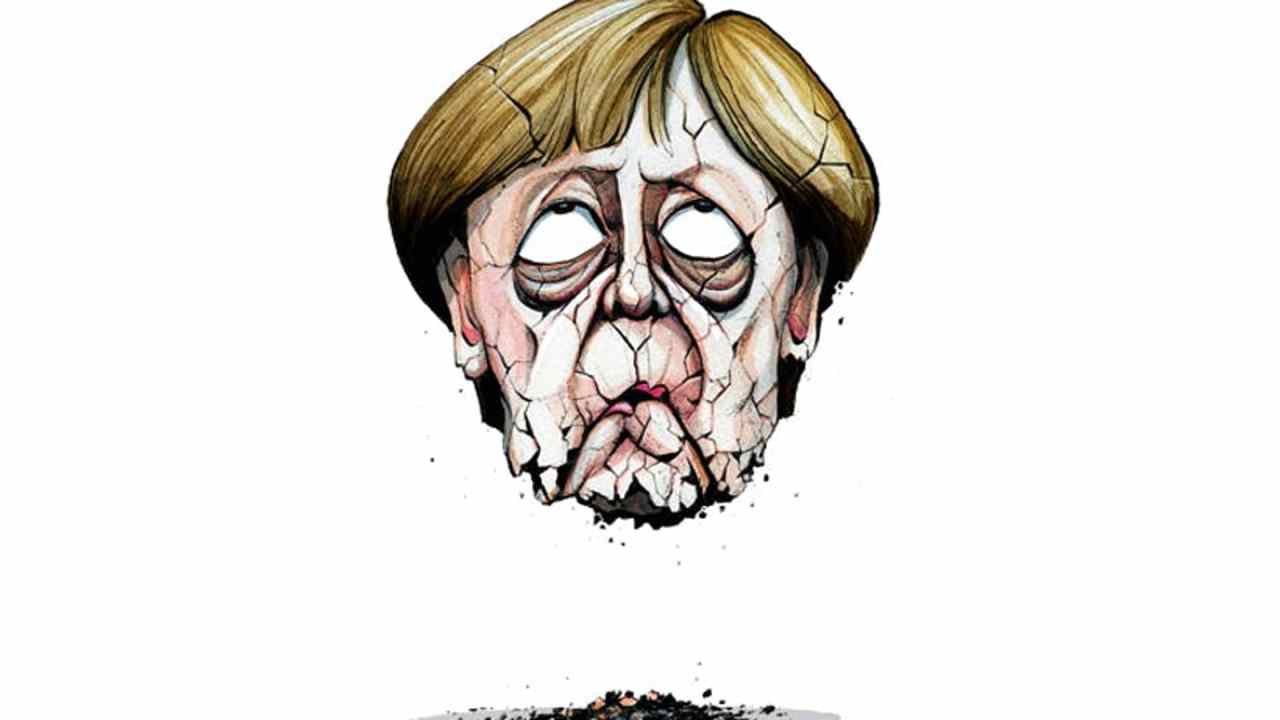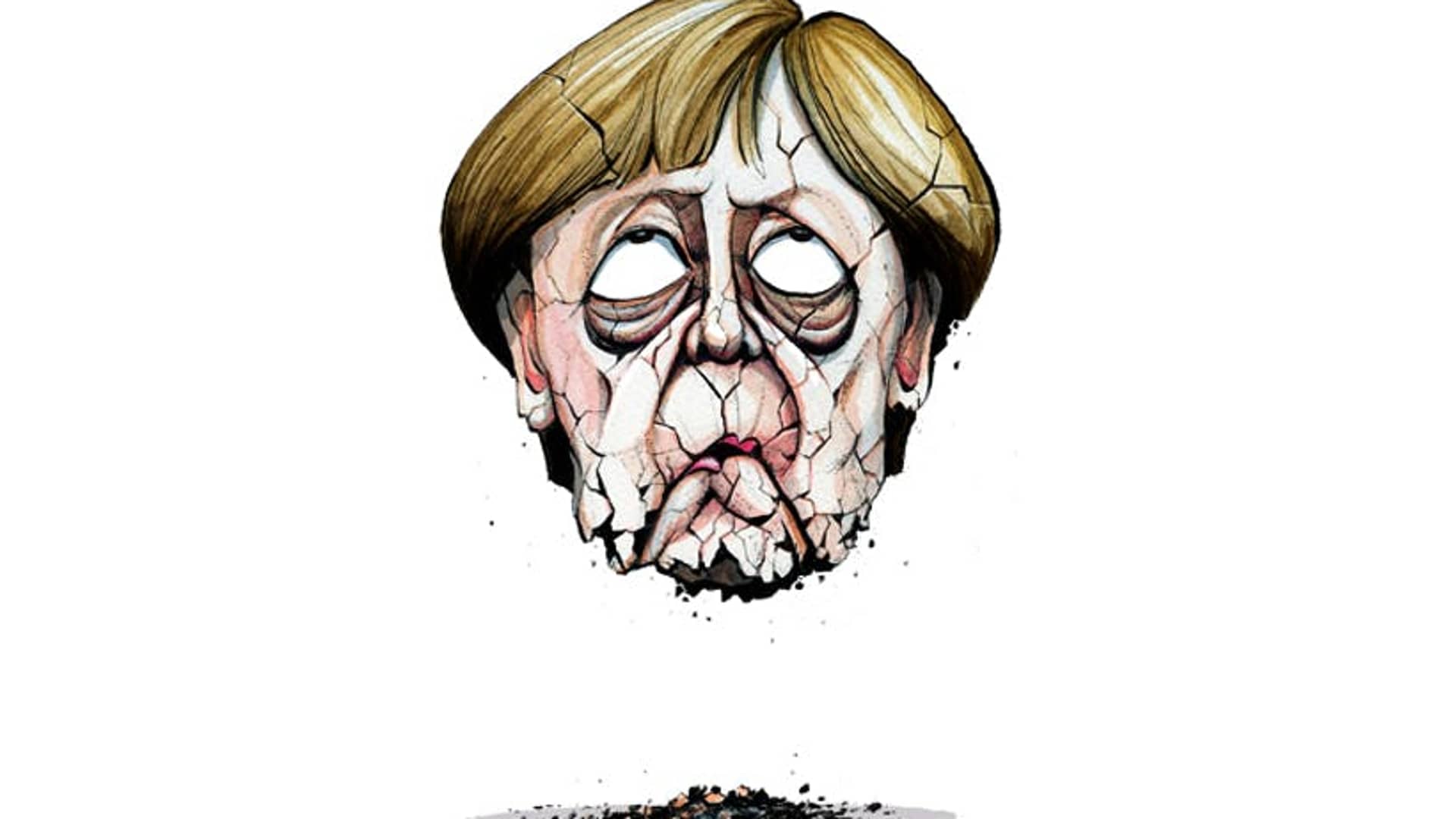For a country with a reputation for being staid and predictable, the election campaign that closes the Merkel era in Germany has not been without its dramas.
The opening of the campaign coincided with a flood disaster in the north-west of the country, which propelled climate change to the top of the agenda. Then favourite and assumed Merkel-successor, Armin Laschet, was undone when he was caught on camera joshing with colleagues amid the human misery.
Then, earlier this month, police raided the offices of the finance and justice ministries as part of a money-laundering investigation that could harm the prospects of the current front-runner, the deputy chancellor, finance minister and Social-Democrat contender, Olaf Scholz.
These two subjects – climate and dirty money – have dominated the campaign leading up to polling day on Sunday. In the last television debate – or Triell, as they are being called this year, as the three leading candidates take part – was no exception. Laschet and the Green candidate, Annalena Baerbock, locked horns on climate; Scholz was put on the spot over money-laundering, and so the debate trundled on.
One subject, though, has been almost totally absent both from the debates and from the rest of the campaign, even though it started out as second only to climate in the list of voters’ concerns. This is migration – or ‘refugee policy’ (Fluechtlingspolitik), as it is mostly referred to in Germany. Reporting on the final debate, which took place on Sunday night, the popular Bild paper noted that ‘the important theme of migration was simply left out’.
As a visitor in Germany, it is also clear that migration has become a risky subject to discuss in public
This makes for quite a contrast with the last parliamentary elections four years ago, when Angela Merkel’s decision to admit more than a million new arrivals during the 2015 refugee crisis may have cost her the best chance any recent German political leader has had to win an overall majority in the Bundestag. The big shock of that campaign was the performance of the right-wing Alternative fur Deutschland (AfD), which leapfrogged over the Greens and the free-market FDP to win 13 per cent of the vote. In doing so, they passed the threshold for representation in parliament for the first time.
This time around though, the AfD has become part of the political furniture. It is currently polling around 11 per cent, but has dropped much of its xenophobic talk, and currently stands fifth – after the two main parties, the Greens and the FDP.
The quieter AfD presence might help to explain why migration has taken a lower profile. But this is less than a lower profile; it is an almost complete absence. Not only has the bulk of the campaign passed without migration warranting a mention, but the fact of its absence has hardly been remarked upon either. Even the throwaway line in the Bild newspaper was an exception.
Of course, one reason – the most positive reason – why migration may have disappeared from the agenda is that voters are more or less happy with how things are going, that the million Syrians and others are settling well into German life and that Merkel has been largely vindicated in her positively heroic reassurance, ‘wir schaffen das’ (we can do it).
And it would be wrong to exclude that possibility completely. If huge problems had arisen at a national level, it is hard to believe they would not be featuring prominently in the election campaign. It is worth noting, too, that Germany has been mercifully free of major terrorist attacks since 2016.
So maybe all is well. But an idyll of peaceful integration is not quite the picture that voters themselves, or politicians, paint when they are canvassed by pollsters or speak in private, with the difficulties of integration and the cost being particular concerns. That these practical considerations tend to be the responsibility of local governments may be one reason why candidates for Chancellor have been able to avoid the subject. But why have they tried so hard to do so?
The most obvious reason is that no politician sees any political capital to be gained from airing the subject of migration, and a lot that could be lost. Sowing division would be one consequence that would complicate the business of forming a coalition government – the most likely election outcome.
Another could be the fear that, once unleashed, divisions over migration could take over the whole campaign, and nobody had an interest in that, not least because the only party to gain would be the AfD.
As a visitor in Germany, it is also clear that migration has become a risky subject to discuss in public; people know to be wary, and stick to politically correct platitudes about opposing racism and supporting diversity. The same surely applies if and when they are contacted by pollsters.
There was just one occasion during the election campaign when the silence looked as though it might be broken: during the chaotic mass evacuation from Afghanistan last month, when German troops were among the last before the British and the Americans to leave.
For a moment, it looked like a row would break out between those who wanted more help for more refugees and those who most certainly did not. The embryonic argument was defused by Merkel and her ministers saying not very much and sheltering behind bland EU statements. This conveyed two messages: Germany would do its bit, but there would be no repeat of 2015. The subject was put back in its box.
The only party to have a line on migration at all is the FDP, which has argued that Germany needs more migration to remedy its increasing shortage of workers, but – in an echo of the UK debate – that it should be migration of the points-based, Australian variety, targeting skills.
One publication, to its credit, has at least posed the question about the electoral silence over migration. Last month, Spiegel magazine published a cri de coeur from a journalist, Ferda Ataman – herself of a migrant background – asking Germans to ‘trust themselves to talk about migration’.
She offered several reasons why the subject needed to be aired, including the growing proportion of voters with a migrant background and the possibility of showing that many Germans took a positive and generous view of migrants. Her piece also made the point that migration was a subject of global significance that was not going away and stated the importance of migrants to the German economy.
There were dangers, she suggested, in sweeping the whole issue under the carpet. Which indeed there are, starting with the uncertainty there must be about the polling, given that a subject that is high on voters’ agenda has hardly seen the light of day.
Will it be a factor when they come face to face with the ballot paper? The politicians may not be talking about it now, but the repercussions of Merkel’s response to the 2015 crisis will loom large in the in-box of whoever wins.







Comments